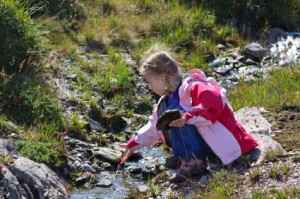Those Lazy Carefree Days of Childhood
 …a prolonged season of carefree, open-ended learning when children are young lays a foundation for diligent and directed studies during high school.
…a prolonged season of carefree, open-ended learning when children are young lays a foundation for diligent and directed studies during high school.
During high school the school days of our four teens consisted of challenging courses such as pre-calculus, French III, molecular biology, and Advanced Placement history. For the most part, they cracked the books from early in the morning until sometimes late at night. The evidence of their efforts was scattered about in almost every room of our house: college-level texts highlighted extensively, notebooks scrawled with study notes and complex math problems, graphing calculators and protractors, drafts of analytical essays-in-progress, and stacks of video lectures.
How did they stay motivated and focused (for the most part) and not buckle under pressure or revolt? Let me roll back the clock for you. Here’s what the early elementary days looked like at our house:
Leisurely mornings, frequent field trips to nature parks, museums, and science centers…long afternoons curled up in a favorite chair with a book, uninterrupted time for puppet shows, imaginative play and art project…lots of trips to the library, lots of time for thinking, lots of time outdoors.
In short, I’m convinced the prolonged season of carefree, open-ended learning when our children were young laid the foundation for diligent and directed studies during high school. Why? Because they weren’t burnt out by years and years of formalized, structured learning already. When it came time to confine much of the day to seatwork, to evaluate learning with tests and grades, to plow through rigorous and foreign matters; we were ready for the challenge. It was something new, something different, a signal of new responsibility and maturity on our part. It was time to apply ourselves in a disciplined, focused way because this was going to count towards our future.
Further, I believe that a less formalized approach to the elementary years was a critical preparation for this future learning. Here’s why:
Kids who bring broad background knowledge to a challenging subject such as biology have a much easier time processing and categorizing new information. The child who has spent hours exploring the stream that runs through the woods and has seen the mayflies, speckled trout, and tadpoles turning into frogs; or has noted the variations in leaves scattered about the ground and tracks of various animals fresh in the mud early each morning has a treasure trove of firsthand knowledge to draw upon. When you show this kid the complex system of taxonomy field biologists have developed for categorizing living things, she isn’t thrown for a loop by all these Latinate names: she’s been categorizing living things unconsciously for years. She knows the distinguishing characteristics of many plants, animals and insects. She’s caught and collected a lot of them. The only thing she has to master in this scenario is the difficult names. Whereas, the child who has only had days filled with reading about them in his elementary science textbook is trying to memorize the scientific name of something he’s never seen, let alone handled. He doesn’t have the framework in place to do it.
Have you seen this phenomenon at work in your home? What areas have your children taken to like a duck to water? What role do leisure and exploration play in their education?
